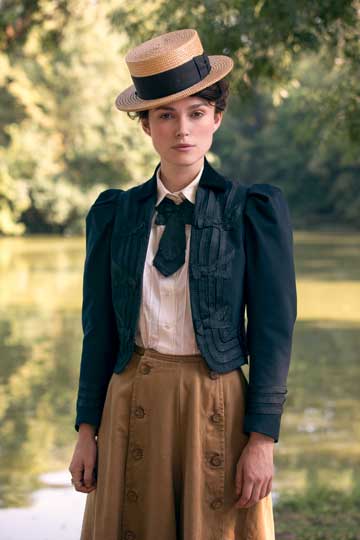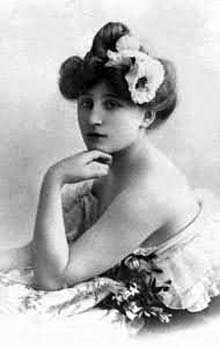Film (2018)
Directed by Wash Westmoreland
Screenplay by Richard Glatzer, Wash Westmoreland, Rebecca Lenkiewicz
Based on story by Richard Glatzer
Music by Thomas Adès; Cinematography by Giles Nuttgens; Film Editing by Lucia Zucchetti
With Keira Knightley (Colette), Fiona Shaw (Sido), Dominic West (Willy)

in “Colette”
A Bleecker Street release.
Credit: Robert Viglasky / Bleecker Street
As a young girl, Colette (Keira Knightley), originally Sidonie-Gabrielle Colette, took up with and married the much older Henry Gauthier-Villars aka Willy (Dominic West), a professional writer who mostly had ghostwriters create his works. Strained by economic hardship and under the gun, Willy asks Colette to pen some novels about her girlhood which would get published under his nom-de-plume. She does, and he publishes them, to great commercial success. The first of the so-called Claudine novels was followed by many more, all of which Colette penned and all of which Willy published as his own. But Willy, a roue and spendthrift, always manages to fritter away their earnings. He is a philanderer to boot, though Colette and he manage to work out an arrangement, particularly after she begins to take up with women. Gradually Colette gets a sense of herself as a writer and an independent woman and things develop accordingly.
Keira Knightley has shone in some wonderful period dramas, notably Pride and Prejudice (2005), Atonement (2007) and The Imitation Game (2014), and she does so here as well. She is sharp and punctuated in this role, simmering with internal steam. She does a great job of depicting the voyage from guileless girlhood to confident womanhood while navigating the choppy seas of her marriage. She plays bisexuality convincingly, generating a sense of honest passion on both fronts.
Dominic West is a loveable heel, somehow managing to convey a positive sense of the roguish Willy in such a way that the manipulated and seething Colette honestly seems to melt under his gaze, at least until the storm clouds appear.
The script is written wittily, offering a sense of what drives the great writer through the enormous obstruction before her, and what allows her to liberate herself sensually from its entrapments. Chronologically designed, it never plods along, but allows the continually ebullient protagonist to leap through her paces and carry the evolution of her character and story forward with a bounce.
Music by Thomas Ades in notably affecting, full of literary film-music character, but distinctive and inventively offbeat enough to lift it out of the realm of the expected, quite appropriate for depicting the main character.
Editing and direction are first-rate, yielding performances all around that carry the central glow to the peripheries, and which plots the moves forward with deft governance.
There are funny as well as beautiful revelations of sensuality, and Knightley exploits them all with boldness, fancy and revelry.
Overall: A lovely period piece depicting a bold, daring and eventually independent woman

– BADMan
Leave a Reply